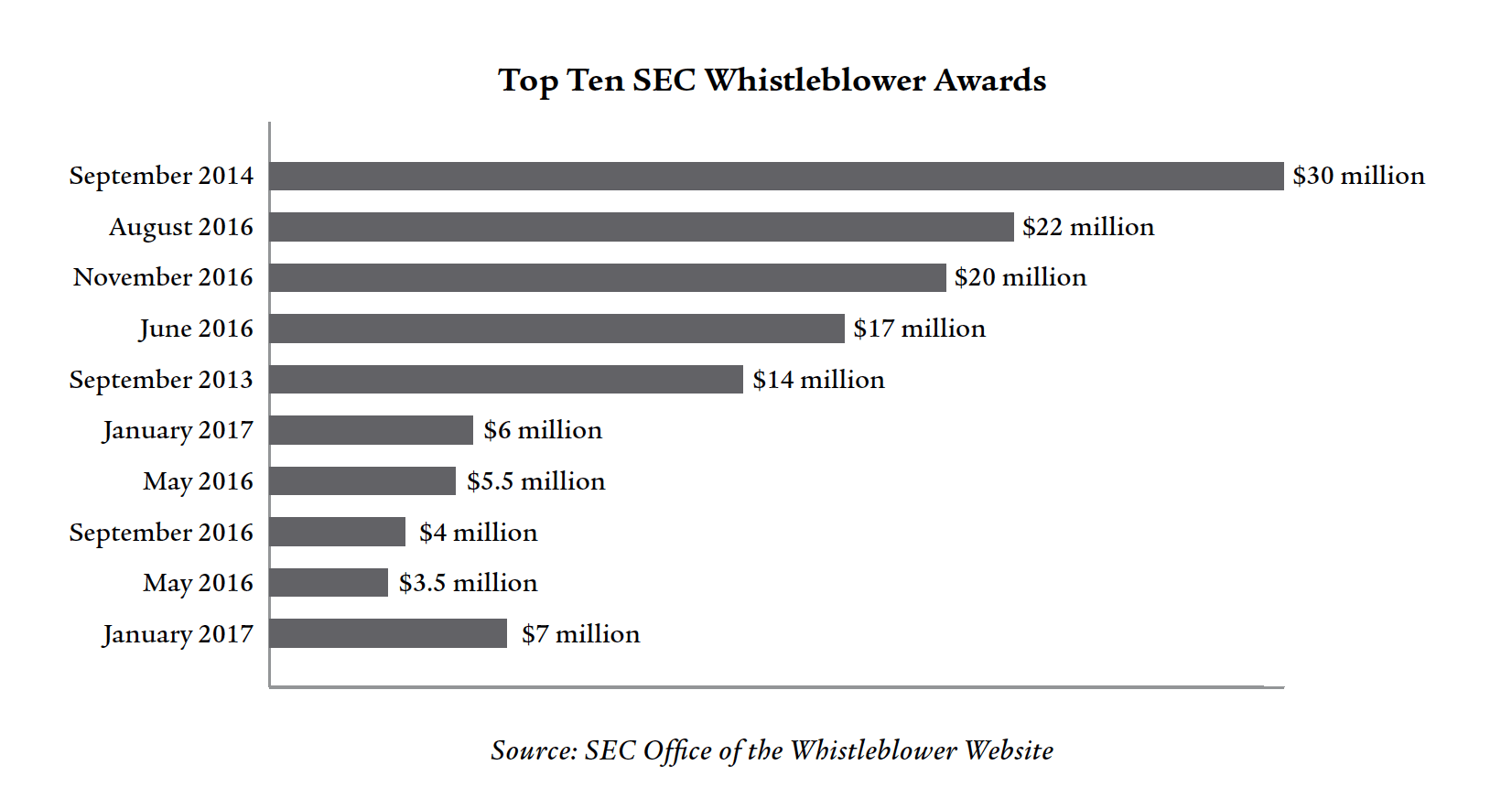RULE 19
Dodd-Frank (Securities & Commodities): Report to the SEC/CFTC

Introduction
The Dodd-Frank Act is a prominent whistleblower legislation, often serving as a model for drafting new laws. It established robust whistleblower programs within the Securities and Exchange Commission (SEC) and Commodity Futures Trading Commission (CFTC).
Enacted in the wake of the 2008 financial crisis, the Act provides whistleblowers with comprehensive protections, including confidentiality, anonymity, minimum awards, and potential rewards for related actions.
Practice Tips
- The sections of Dodd-Frank that relate to whistleblower rewards are Section 748 (Commodity Exchange Act) (7 U.S.C. § 26) and Sections 922-24 (Securities Exchange Act) (15 U.S.C. § 78u-6).
- On June 13 and August 25, 2011, the SEC and CFTC published final rules implementing the Dodd-Frank whistleblower reward program.These regulations have been subsequently amended. The SEC’s Office of the Whistleblower publishes one of the best websites for whistleblowers: www.sec.gov/whistleblower. It posts all SEC award rulings and copies of the law and regulations.
- The CFTC also publishes a similar highly useful website at www.whistleblower.gov.
Resources
The two main whistleblower reward laws in Dodd-Frank are codified at 7 U.S.C. § 26 (commodities);
- 15 U.S.C. § 78u-6 (securities); and
- 12 U.S.C. § 5567 (consumer protection)
The SEC and CFTC also have jurisdiction to investigate and pay rewards related to foreign corruption cases:
The Securities and Exchange Commission (SEC) and the Commodities Futures Trading Commission (CFTC) published rules governing the whistleblower rewards provisions of Dodd-Frank. The SEC’s rules are codified at 17 C.F.R. 21F . To read the all SEC regulations see 17 C.F.R. Parts 240 and 249 (page 228). The CFTC rules are codified at 17 C.F.R. Part 165.
Reward claims must be filed as mandated under the rules of the SEC or CFTC. The failure to follow these procedures can result in the denial of a reward. These rules apply to both U.S. violations and violations related to foreign corruption.
Detailed explanations of these rules were published by the two commissions:
Additionally, on September 23, 2020, the SEC completed a second major rule making concerning its whistleblower program, which was published at:
The CFTC also amended its initial whistleblower rules:
- 82 Federal Register 24487 (May 30, 2017). These rules are subject to future amendments.
Dodd-Frank Act, Public Law No. 111-203, 124 Statutes at Large 1376 (July 21, 2010), included a number of enhancements for whistleblower protections in addition to the reward laws. The following sections of Dodd-Frank enhance whistleblower rights:
- § 748 creates a new section 23 of the Commodities Exchange Act that provides for mandatory whistleblower rewards and prohibits retaliation
- § 922 creates a new 21F of the Securities Exchange Act that provides for mandatory whistleblower rewards and prohibits retaliation
- §§ 922 and 929A contain the provisions that amended and improved the Sarbanes-Oxley whistleblower protections
- § 924 requires the SEC to establish a special whistleblower office and enact regulations enforcing whistleblower rules
- § 1507 establishes new whistleblower protections for employees who make protected disclosures related to the enforcement of the Bureau of Consumer Financial Protection
- § 1079B(c) amended the False Claims Act anti-retaliation law to provide for a universal national three-year statute of limitations to file wrongful discharge/retaliation claims under the FCA
The legislative history of Dodd-Frank:
- U.S. Senate Committee on Banking, Housing, and Urban Affairs, “The Restoring American Financial Stability Act of 2010,” Senate Report No. 111-176, 111th Cong., 2nd Sess. (Apr. 30, 2010) (the final Senate Report containing the legislative history/analysis of the Dodd-Frank Act)
- Also see: U.S. Senate Committee on Banking, Housing, and Urban Affairs, “Dodd-Frank Wall Street Reform and Consumer Protection Act: Conference Report,” Senate Report No. 111-517, 111th Cong., 2nd Sess. (June 29, 2010) (containing the final text of the Dodd-Frank Act).
Prior to the passage of the Dodd-Frank Act, the Inspector General for the SEC concluded that the existing voluntary bounty program was gravely deficient:
- Securities and Exchange Commission, Office of Inspector General, Office of Audit, “Assessment of the SEC’s Bounty Program,” Report No. 474 (Mar. 29, 2010).
The Office of Inspector General was also very critical of the SEC’s handling of the Madoff scandal and the whistleblowers who had stepped forward:
- SEC, Office of Inspector General, Office of Investigations, “Investigation of Failure of the SEC to Uncover Bernard Madoff’s Ponzi Scheme,” OIG Report No. OIG-509 (Aug. 31, 2009).
Quick Links
Frequently Asked Questions
Order Your Copy Today!
All purchases or donations proceeds go to support the National Whistleblower Center, a 501(c)(3) non-profit organization dedicated to supporting whistleblowers.
Shipping is to the United States Only
For international orders, please contact [email protected].







